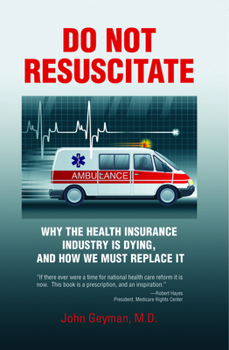Do Not Resuscitate: Why the Health Insurance Industry Is Dying, and How We Must Replace It
"Geyman's literary voice arises from his unusual professional and political trajectories: from country doctor to academic department chair and prominent journal editor, and from longtime Republican to president of Physicians for a National Health Program . . . a passionate advocate and scholar."--The New England Journal of Medicine "The raging debate over how to pay for health insurance has missed a profoundly important fact: As big...
Format:Paperback
Language:English
ISBN:1567513964
ISBN13:9781567513967
Release Date:June 2009
Publisher:Common Courage Press
Length:352 Pages
Weight:1.00 lbs.
Dimensions:0.7" x 6.0" x 8.8"
Customer Reviews
2 ratings
DOES OUR INSURANCE ACTUALLY PROTECT US?
Published by Thriftbooks.com User , 15 years ago
In this highly researched and well-written book, Dr. John Geyman lays out in clear language the repeated failure of the private health insurance industry to provide affordable and comprehensive coverage. With a wealth of facts and figures, Dr. Geyman shows how the continuous rise of health care costs has meant insurance companies must work hard at excluding anyone who might require expensive treatment, reduce coverage for everyone and constantly raise premium rates. This has led to awareness on the part of the public that their insurance may not protect them from medical bankruptcy. Americans now see that a serious illness can mean huge debt, wipe out their retirement savings and even mean selling their home to pay the bills. The insurance industry was not always as focused on profits as it is now. Geyman takes us on a tour through the history of private coverage, showing how the original Blue Cross/Blue Shield plans were about spreading risk across a broad pool and keeping coverage affordable. As commercial carriers came into the market, they brought with them "medical underwriting" which looks at applicants in terms of how much they might cost the company. For-profit companies structured their coverage to minimize their risk (by denying coverage to those who need it the most) and maximize their profits. The Blues could not survive without doing the same thing. Today, most of the Blue Cross companies are for-profit, many having been acquired by one of the big players in health insurance. While Congress has required employer-sponsored group insurance to take everyone in the group and charge them all the same rate, companies are free to deny coverage to people who apply on their own and to offer unaffordable rates to older, sicker people. Companies have a long list of risk factors that trigger a denial. Here's some reasons used by California insurers in 2006 to deny coverage: attention deficit disorder, breast implants, infertility, herpes, gender reassignment, migraines, miscarriage, bed-wetting, ringworm, varicose veins... and that's not all. While these companies like to disparage government health care programs, they have been quick to profit from these same programs. The Bush administration didn't think it worthwhile to increase funding for SCHIP (the Children's Health Insurance program) but allowed private insurance to profit by offering "Medicare Advantage" policies to Medicare recipients and pay them more than the cost of original Medicare. The administration gave a windfall to the pharmaceutical industry through its so-called drug benefit; this is a boondoggle that is totally structured to "benefit" only the insurance industry and the drug companies. Insurance companies have also been allowed into Medicaid, which is administered by the states, and, though it is supposed to cover health care for the poor, often has such a low threshhold that few qualify (and when they qualify, they have to constantly requalify). It is partly this r
Essential reading for anyone interested in health care
Published by Thriftbooks.com User , 16 years ago
Physician John Geyman, emeritus professor at the University of Washington medical school, lays out a detailed and compelling case for a single-payer national health insurance program for the United States. Geyman traces the development of the private insurance industry from its non-profit beginnings to the profit-seeking, risk-avoiding behemoth of today. He then dissects industry practices, including denial of coverage, bait and switch, policy cancellation, limited benefit policies, inadequate disclosure, deceptive marketing, and outright fraud. He debunks the most pervasive myths about health and health care, then discusses how the industry is coming under increasing stress as employer-sponsored insurance declines and individual policies cannot fill the gap because of their exorbitant expense and inadequate benefits. Chapter Six, "Saving Lives or Saving the Industry?" should be read by every politician in this country, as Geyman eviscerates the incremental "reform" plans of the last 30 years, including failing individual mandate plans like the "Massachusetts Miracle." Geyman next examines insurance industry spin, the current battle over SCHIP, and the array of forces against fundamental reform. He concludes by outlining a national insurance program which would fold in existing federal programs including Medicare, Medicaid, and SCHIP, financed by payroll and income taxes to replace private insurance premiums. About $350 billion yearly could be saved by administrative simplification and bulk purchasing. If I could force Barack Obama (or John McCain, for that matter) to read one book, this would be it.





